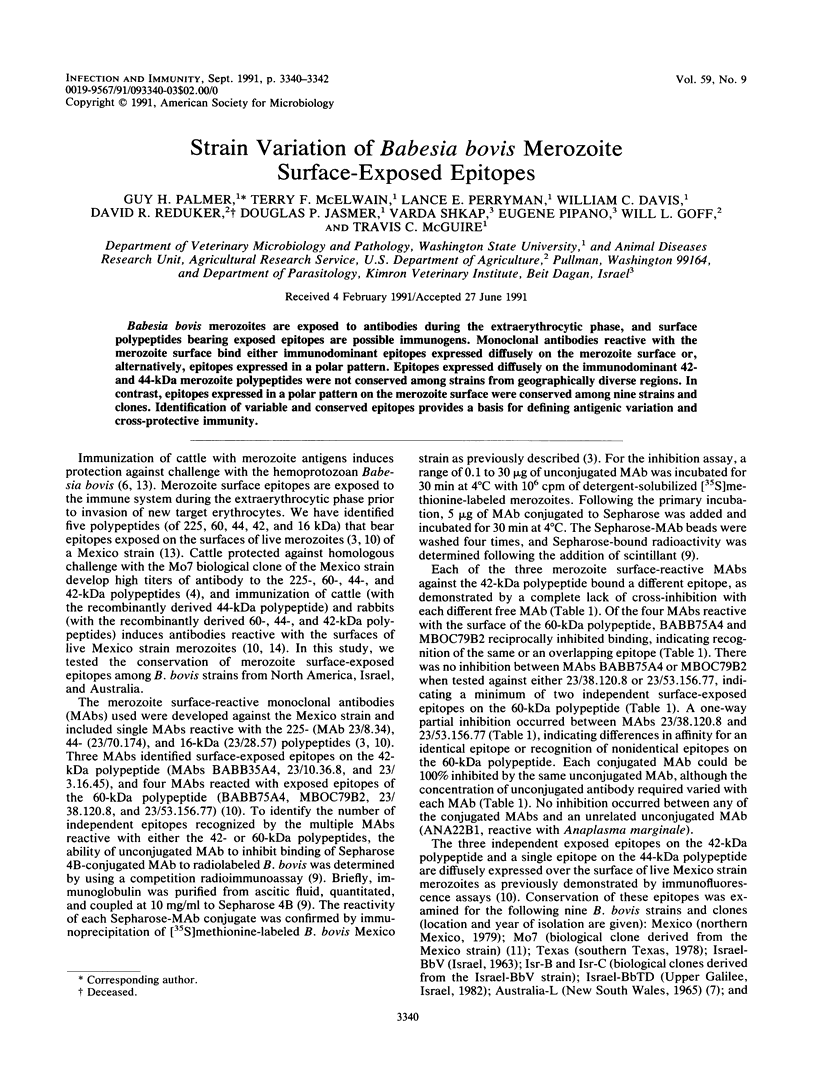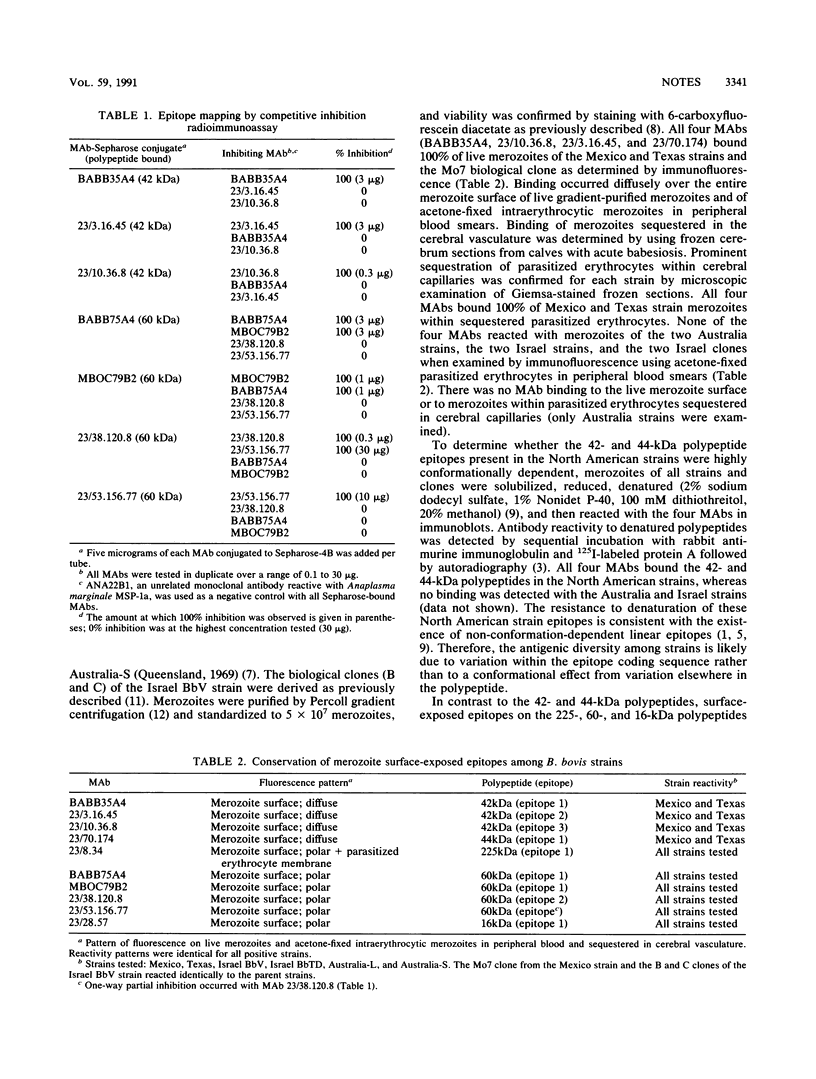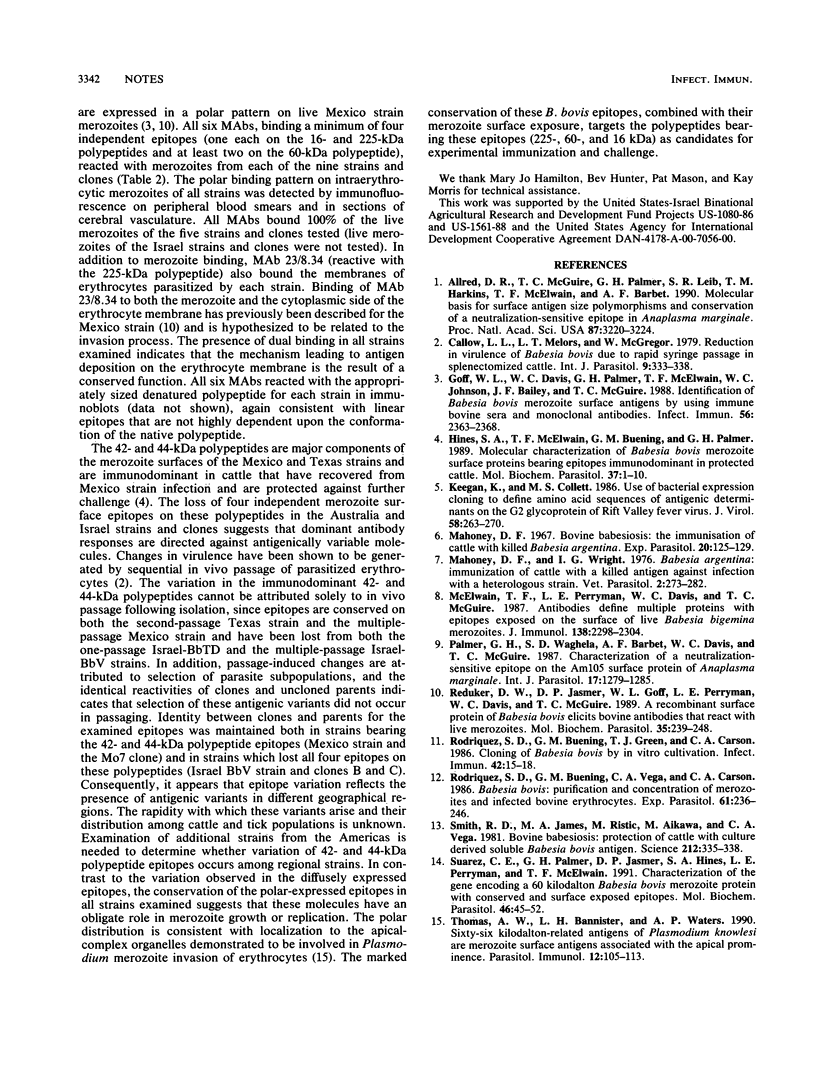Abstract
Babesia bovis merozoites are exposed to antibodies during the extraerythrocytic phase, and surface polypeptides bearing exposed epitopes are possible immunogens. Monoclonal antibodies reactive with the merozoite surface bind either immunodominant epitopes expressed diffusely on the merozoite surface or, alternatively, epitopes expressed in a polar pattern. Epitopes expressed diffusely on the immunodominant 42- and 44-kDa merozoite polypeptides were not conserved among strains from geographically diverse regions. In contrast, epitopes expressed in a polar pattern on the merozoite surface were conserved among nine strains and clones. Identification of variables and conserved epitopes provides a basis for defining antigenic variation and cross-protective immunity.
Full text
PDF


Selected References
These references are in PubMed. This may not be the complete list of references from this article.
- Allred D. R., McGuire T. C., Palmer G. H., Leib S. R., Harkins T. M., McElwain T. F., Barbet A. F. Molecular basis for surface antigen size polymorphisms and conservation of a neutralization-sensitive epitope in Anaplasma marginale. Proc Natl Acad Sci U S A. 1990 Apr;87(8):3220–3224. doi: 10.1073/pnas.87.8.3220. [DOI] [PMC free article] [PubMed] [Google Scholar]
- Callow L. L., Mellors L. T., McGregor W. Reduction in virulence of Babesia bovis due to rapid passage in splenectomized cattle. Int J Parasitol. 1979 Aug;9(4):333–338. doi: 10.1016/0020-7519(79)90083-3. [DOI] [PubMed] [Google Scholar]
- Goff W. L., Davis W. C., Palmer G. H., McElwain T. F., Johnson W. C., Bailey J. F., McGuire T. C. Identification of Babesia bovis merozoite surface antigens by using immune bovine sera and monoclonal antibodies. Infect Immun. 1988 Sep;56(9):2363–2368. doi: 10.1128/iai.56.9.2363-2368.1988. [DOI] [PMC free article] [PubMed] [Google Scholar]
- Hines S. A., McElwain T. F., Buening G. M., Palmer G. H. Molecular characterization of Babesia bovis merozoite surface proteins bearing epitopes immunodominant in protected cattle. Mol Biochem Parasitol. 1989 Nov;37(1):1–9. doi: 10.1016/0166-6851(89)90096-0. [DOI] [PubMed] [Google Scholar]
- Keegan K., Collett M. S. Use of bacterial expression cloning to define the amino acid sequences of antigenic determinants on the G2 glycoprotein of Rift Valley fever virus. J Virol. 1986 May;58(2):263–270. doi: 10.1128/jvi.58.2.263-270.1986. [DOI] [PMC free article] [PubMed] [Google Scholar]
- Mahoney D. F. Bovine babesiosis: the immunization of cattle with killed Babesia argentina. Exp Parasitol. 1967 Feb;20(1):125–129. doi: 10.1016/0014-4894(67)90030-6. [DOI] [PubMed] [Google Scholar]
- McElwain T. F., Perryman L. E., Davis W. C., McGuire T. C. Antibodies define multiple proteins with epitopes exposed on the surface of live Babesia bigemina merozoites. J Immunol. 1987 Apr 1;138(7):2298–2304. [PubMed] [Google Scholar]
- Palmer G. H., Waghela S. D., Barbet A. F., Davis W. C., McGuire T. C. Characterization of a neutralization-sensitive epitope on the Am 105 surface protein of Anaplasma marginale. Int J Parasitol. 1987 Oct;17(7):1279–1285. doi: 10.1016/0020-7519(87)90093-2. [DOI] [PubMed] [Google Scholar]
- Reduker D. W., Jasmer D. P., Goff W. L., Perryman L. E., Davis W. C., McGuire T. C. A recombinant surface protein of Babesia bovis elicits bovine antibodies that react with live merozoites. Mol Biochem Parasitol. 1989 Jul;35(3):239–247. doi: 10.1016/0166-6851(89)90210-7. [DOI] [PubMed] [Google Scholar]
- Rodriguez S. D., Buening G. M., Green T. J., Carson C. A. Cloning of Babesia bovis by in vitro cultivation. Infect Immun. 1983 Oct;42(1):15–18. doi: 10.1128/iai.42.1.15-18.1983. [DOI] [PMC free article] [PubMed] [Google Scholar]
- Rodriguez S. D., Buening G. M., Vega C. A., Carson C. A. Babesia bovis: purification and concentration of merozoites and infected bovine erythrocytes. Exp Parasitol. 1986 Apr;61(2):236–243. doi: 10.1016/0014-4894(86)90157-8. [DOI] [PubMed] [Google Scholar]
- Smith R. D., James M. A., Ristic M., Aikawa M., Vega y Murguia C. A. Bovine babesiosis: protection of cattle with culture-derived soluble Babesia bovis antigen. Science. 1981 Apr 17;212(4492):335–338. doi: 10.1126/science.7209532. [DOI] [PubMed] [Google Scholar]
- Suarez C. E., Palmer G. H., Jasmer D. P., Hines S. A., Perryman L. E., McElwain T. F. Characterization of the gene encoding a 60-kilodalton Babesia bovis merozoite protein with conserved and surface exposed epitopes. Mol Biochem Parasitol. 1991 May;46(1):45–52. doi: 10.1016/0166-6851(91)90197-e. [DOI] [PubMed] [Google Scholar]
- Thomas A. W., Bannister L. H., Waters A. P. Sixty-six kilodalton-related antigens of Plasmodium knowlesi are merozoite surface antigens associated with the apical prominence. Parasite Immunol. 1990 Mar;12(2):105–113. doi: 10.1111/j.1365-3024.1990.tb00940.x. [DOI] [PubMed] [Google Scholar]


